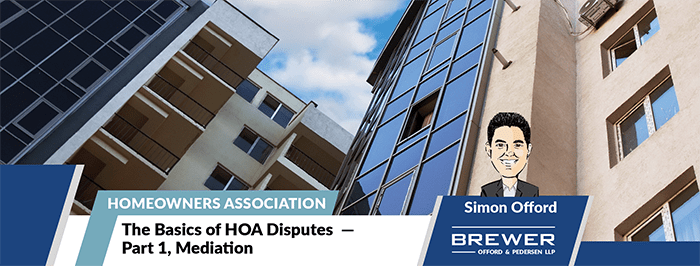HOA disputes are something that we see on a regular basis. Although in a perfect world, none of us would get in disputes with our neighbors, the reality is that disputes between neighbors, or the association and an owner, are exceedingly common. However, most HOA CC&Rs have provisions to try and resolve these disputes without litigation. Moreover, if the CC&Rs do not have such provisions, the law governing HOA disputes, the Davis-Stirling Act, also has requirements for dispute resolution.
Over the decades, mediation has become an increasingly popular tool to resolve disputes. Most real estate contracts contain a mandatory mediation provision. Similarly, almost every set of CC&Rs I have seen also contain one. Finally, the Davis-Stirling Act requires mediation. So, the first question is, what is mediation?
What is Mediation?
Mediation is a process by which a neutral (usually agreed upon by the parties) attempts to facilitate a settlement between the parties. The mediators we prefer to use are generally experienced real estate attorneys or retired judges. Mediation is fairly informal and collaborative. The parties generally are separated and the mediator spends time with both sides to try and understand everyone’s position and communicate each side’s position to the other. The mediator has no decision-making authority, thus the only way the cases settles is if both parties agree to a settlement. Ideally, such settlement is documented at the mediation so parties cannot later change their mind before committing in writing.
When is Mediation Required?
Most every set of CC&Rs require parties (or the HOA) seeking to enforce the CC&Rs mediate their disputes before filing suit. However, some HOAs even require the parties engage in “internal dispute resolution,” (IDR) whereby the parties are required to resolve their dispute by way of some sort of meeting or hearing with the HOA. These IDR provisions sometimes have specific guidelines, other times they are more open-ended. However the purpose is generally to try and work together as neighbors with the HOA to get a resolution. Generally, if an IDR provision exists, only after complying with the IDR provisions may the parties proceed to mediation with a third party mediator.
If there are no IDR provisions, mediation will almost always be required to enforce the CC&Rs, if not in the CC&Rs, then by the Davis-Stirling Act. Exceptions for mediation commonly exist for actions that are for injunctive relief, matters that are below the small claims jurisdiction ($10,000) or collection of delinquent assessments (these are the exceptions under the law, and most CC&Rs reiterate the same). However, parties can still choose to mediate these disputes if desired.
What Happens if One Side Refuses to Mediate or the Mediation is not Successful?
If a party unreasonably refuses mediation, the court can take this refusal into consideration when awarding attorney fees to the prevailing party. This is significant, because the prevailing party in an action to enforce the CC&Rs is entitled to recover their reasonable attorney fees and costs. However, if the prevailing party refused to mediate, the Court can limit or altogether refuse to award the prevailing party fees.
In the event mediation is unsuccessful, or if one party refuses to participate, then the party seeking to enforce the CC&Rs can proceed to the next step, which is either filing suit in the Superior Court or demanding arbitration. However, the differences between filing suit and arbitration is a whole topic unto itself, so you will have to wait for the next article to learn about these differences.




